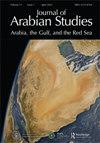Cursed No More? The Resource Curse, Gender, and Labor Nationalization Policies in the GCC
Q1 Social Sciences
引用次数: 7
Abstract
Abstract Recent scholarship posits that the resource curse has gendered as well as economic effects on oil-rich economies, like those in the Middle East and North Africa, entrenching paternalistic relationships that disadvantage women’s entry into the labor force. Upon closer examination, however, it appears that oil may not be the most compelling argument to explain Arab women’s low presence in the workforce –– especially since women’s labor-force participation within the oil rich Gulf Cooperation Council (GCC) states is generally higher than the regional average. We contend that this is, in part, a byproduct of the countries’ labor nationalization policies. Our analysis suggests that oil-driven development can in fact boost female labor force participation, revealing that rentierism as experienced in the GCC can actually have positive externalities for women.不再被诅咒?海湾合作委员会的资源诅咒、性别和劳动力国有化政策
最近的学术研究认为,资源诅咒对中东和北非等石油资源丰富的经济体产生了性别和经济影响,巩固了家长式的关系,不利于女性进入劳动力市场。然而,经过更仔细的研究,石油似乎并不是解释阿拉伯女性劳动力参与率低的最令人信服的理由——尤其是在石油资源丰富的海湾合作委员会(GCC)成员国中,女性的劳动力参与率普遍高于地区平均水平。我们认为,这在一定程度上是这些国家劳工国有化政策的副产品。我们的分析表明,石油驱动的发展实际上可以提高女性的劳动力参与率,这表明海湾合作委员会所经历的食利主义实际上可以对女性产生积极的外部性。
本文章由计算机程序翻译,如有差异,请以英文原文为准。
求助全文
约1分钟内获得全文
求助全文

 求助内容:
求助内容: 应助结果提醒方式:
应助结果提醒方式:


